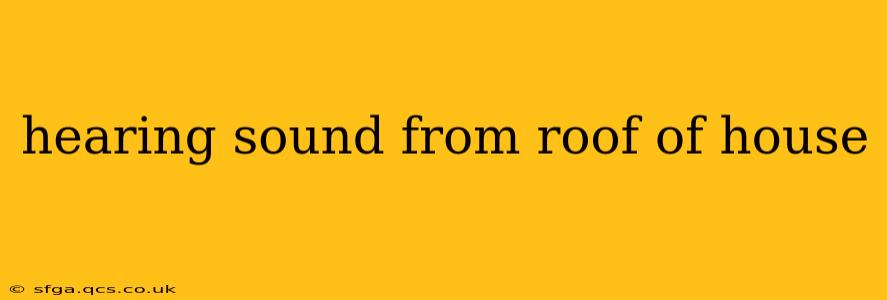Hearing unusual noises coming from your roof can be unsettling. It's a natural reaction to want to understand the source and address any potential problems. This comprehensive guide will explore common causes of roof noises, helping you pinpoint the source and determine the next steps. We'll cover everything from the mundane to the more serious, providing you with the knowledge to confidently address the situation.
What Could Be Making That Noise? Common Causes of Roof Sounds
Many things can cause noises on your roof, ranging from harmless natural occurrences to indicators of significant damage. Let's explore some of the most common culprits:
Animals:
This is a very frequent cause of roof noises. Squirrels, raccoons, birds, and even bats can create a variety of sounds, from scurrying and scratching to rustling and squeaking. The type of noise often depends on the animal and its activity. For example, squirrels are notorious for their chattering and scampering sounds, while raccoons might create more of a rustling or thumping sound.
Wind:
Strong winds can cause significant noise on your roof. The wind whistling through gaps, rattling loose shingles, or vibrating the entire structure can create a range of sounds, from a gentle whoosh to a loud banging or creaking. Loose or damaged flashing around chimneys or vents is especially prone to wind noise.
Rain and Snow:
Water accumulating on the roof can create various sounds, depending on the severity and the roofing materials. A gentle drumming sound is common during light rain, while heavier downpours might result in a more intense pounding. Snow accumulating on the roof, particularly in large amounts, can also create a creaking or groaning sound as the weight shifts.
Tree Branches:
Trees near your house can rub against the roof, particularly during windy conditions, creating scratching or scraping noises. This is often a seasonal issue, more pronounced during periods of strong winds or leaf growth.
Expanding and Contracting Materials:
As temperatures fluctuate, roofing materials expand and contract. This movement can cause creaking or popping sounds, especially noticeable during significant temperature changes. This is a normal occurrence for most roofing materials, especially during seasonal transitions.
Structural Issues:
While less common, roof noises can sometimes indicate more serious structural problems. These could include loose or damaged rafters, sagging roof decking, or issues with the foundation. These problems will often present with more significant and persistent sounds, warranting a professional inspection.
How Do I Identify the Source of the Roof Noise?
Pinpointing the exact source can be challenging but crucial in determining the appropriate course of action. Here's a systematic approach:
- Listen carefully: Pay close attention to the timing, frequency, and type of noise. Is it constant, intermittent, rhythmic, or random?
- Check the weather: Note whether the noise coincides with wind, rain, or snow.
- Inspect the roof visually (safely): From the ground, look for any visible signs of damage, loose shingles, or animal activity. Never attempt a roof inspection without proper safety precautions.
- Check the attic: If accessible, inspect the attic for signs of animal entry, water damage, or structural issues.
What Should I Do if I'm Still Concerned?
If you've tried to identify the source of the noise and remain concerned, it's best to contact a qualified roofing professional. A professional inspection can help determine the cause of the noise and recommend the necessary repairs or preventative measures. Don't delay, addressing roof problems early can prevent more extensive and costly damage in the future.
Is it Normal for My Roof to Make Noise?
Some level of noise is normal, especially during inclement weather. However, persistent, unusual, or loud noises are cause for concern and warrant investigation.
How Often Should I Inspect My Roof?
Regular roof inspections are crucial for preventative maintenance. Aim for at least an annual inspection, or more frequently if you live in an area prone to extreme weather or have noticed any unusual sounds or signs of damage.
This comprehensive guide should help you better understand the potential causes of roof noises and take appropriate action. Remember, safety is paramount; if you are unsure about anything, consult a professional roofing contractor.
